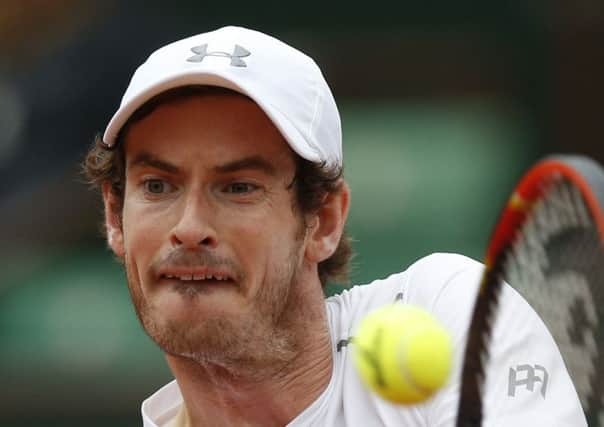Andy Murray to use '˜crib sheet' in French Open final bid


His rivalries with the other members of the Big Four aside, Murray’s record against the rest of the men in the world’s top 10 is pretty one-sided and awfully consistent: Murray wins and the others go home in tears and a taxi. All apart from Wawrinka. True, Murray leads their head-to-head 8-7 but his last victory came back in 2012 in Tokyo just a couple of weeks after Murray had won his first grand slam at the US Open.
But at this rain-sodden French Open, such facts and figures do not matter to Murray. His ambition here is plain to see: the first goal is to reach the final but as he made clear at the very start of the tournament: “I am not here to get to the final”. No, he wants the trophy and to get it, he needs to find a way to get past Wawrinka and his ferocious backhand this afternoon.
Advertisement
Hide AdAdvertisement
Hide AdMurray’s recent losses to the Swiss can be explained away quite simply. In Monte Carlo in 2013, Murray was not even a shadow of the clay court player he is today. Later that year, at the US Open, Murray’s back was in so bad a state that a couple of weeks later, he had surgery to repair the chronic problem and his season was over. Then last November at the year-ending championships in London, Murray’s mind was focused only on the up-coming Davis Cup final. No wonder, then, that he discounts his recent history with the powerful Swiss.
“I’ve obviously got asked questions like that a lot like when I’d lost a bunch of times in a row to Novak,” Murray said. “I was like ‘well, so what?’ The next time I play against him, that doesn’t mean that I’m going to lose again. It’s a totally different day, it’s two individuals and you have to go out and play great tennis to win in the semis of a slam. But you never know what’s going to happen. I don’t put too much thought into those matches. I lost to Kevin Anderson at the US Open last year – I’d beaten him a bunch before I played him. There’s no guarantees regardless of previous results.”
The only real guarantee is that Murray will be doing everything he can think of to keep himself focused. To help him concentrate, he has a crib sheet of handy hints tucked away in his bag and as he was beating Richard Gasquet on Wednesday, he took sly glances at it at every change of ends.
“I’ve been doing that for two years now in most matches that I play,” he said. “Sometimes I look at it at the change of ends, sometimes I don’t, but it can help if you’re losing your way a little bit because it’s not an easy atmosphere that you’re playing in. It’s just sometimes to have something for yourself to concentrate on.”
It is not exactly the same crib sheet for every match but the overall theme rarely changes. When a photographer managed to grab a picture of the list last year at the Rotterdam tournament, it hardly revealed the inner workings of the world No 2’s mind. With such helpful messages as “be good to yourself” and “try your best”, it did seem to be pretty basic stuff although “be intense with your legs” presumably means more to an elite level tennis player than it does to the average bloke in the street. But if it helps Murray concentrate, then that is all that matters.
Although Murray plays a similar game to Novak Djokovic, he does not think that studying last year’s final between the Serb and the Swiss will be much use to him today – “Although our games are fairly similar, we have different strengths and hit shots slightly differently. A year has gone by since then and that match, in a couple of days, doesn’t mean much when we’re out there really,” he said – but at least the slow and heavy conditions ought not to be a problem.
After two weeks of shivering in the cold and sliding about on mud, Murray thinks he is used life at Roland Garros now.
“At the beginning of the tournament I certainly found the conditions difficult,” Murray said. “But we’ve been playing in these conditions the whole event now, you should have made the adjustments to your game so that it’s not a massive factor when you’re on the court.”
Advertisement
Hide AdAdvertisement
Hide AdMurray knows that the biggest factor in determining the outcome of today’s match will be Murray himself.
If he can keep his focus pinpoint sharp, his serve secure and the ball away from Wawrinka’s backhand, a place in the final is possible, no matter what the statistics say on paper.